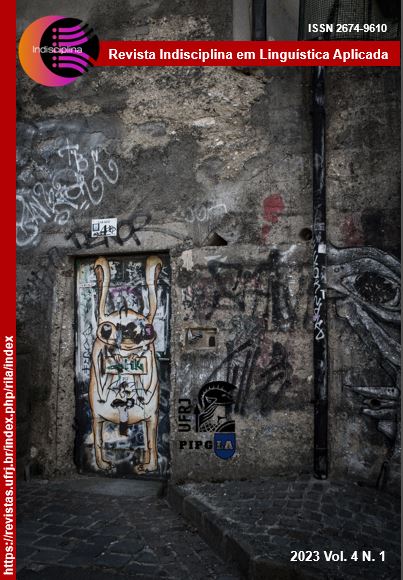The representation of femininity in Lana Del Rey’s songs
Resumo
This article aims to analyze the feminine representation in Lana Del Rey’s songs. In order to achieve that objective, discourse analysis will be used as a useful tool in our studies, since we are going to deal with lyrics in, thus, discourse. Our corpora are her famous songs: Ultraviolence, Ride, This is what makes us girls, Cola and Off to the races. Since Lana Del Rey is a well-known personality in pop music and the majority of her fans are women, we consider that the discourse she conveys in her songs provides feelings of representation and identity, which will be analyzed in our paper. We also expect to find ambiguous discourse, which seems to empower women and their identity in a chauvinist society and, at the same time, seems to portray them as fragile and passive. The results show that Lana draws contradictory accounts on the feminine image, but in a way that makes us aware of women representation face to society. Lana Del Rey’s lyrics reflects a disappointing reality in which it is not that hard to understand why women (and men) try to escape into alcohol, self-injury and other forms of self-destruction.
Downloads
Downloads
Publicado
Edição
Seção
Licença

Este trabalho está licenciado sob uma licença Creative Commons Attribution 4.0 International License.
Autores que publicam nesta revista concordam com os seguintes termos:
- Autores mantém os direitos autorais e concedem à revista o direito de primeira publicação, com o trabalho simultaneamente licenciado sob a Licença Creative Commons Attribution que permite o compartilhamento do trabalho com reconhecimento da autoria e publicação inicial nesta revista.
- Autores têm autorização para assumir contratos adicionais separadamente, para distribuição não-exclusiva da versão do trabalho publicada nesta revista (ex.: publicar em repositório institucional ou como capítulo de livro), com reconhecimento de autoria e publicação inicial nesta revista.
- Autores têm permissão e são estimulados a publicar e distribuir seu trabalho online (ex.: em repositórios institucionais ou na sua página pessoal) a qualquer ponto antes ou durante o processo editorial, já que isso pode gerar alterações produtivas, bem como aumentar o impacto e a citação do trabalho publicado (Veja O Efeito do Acesso Livre).

